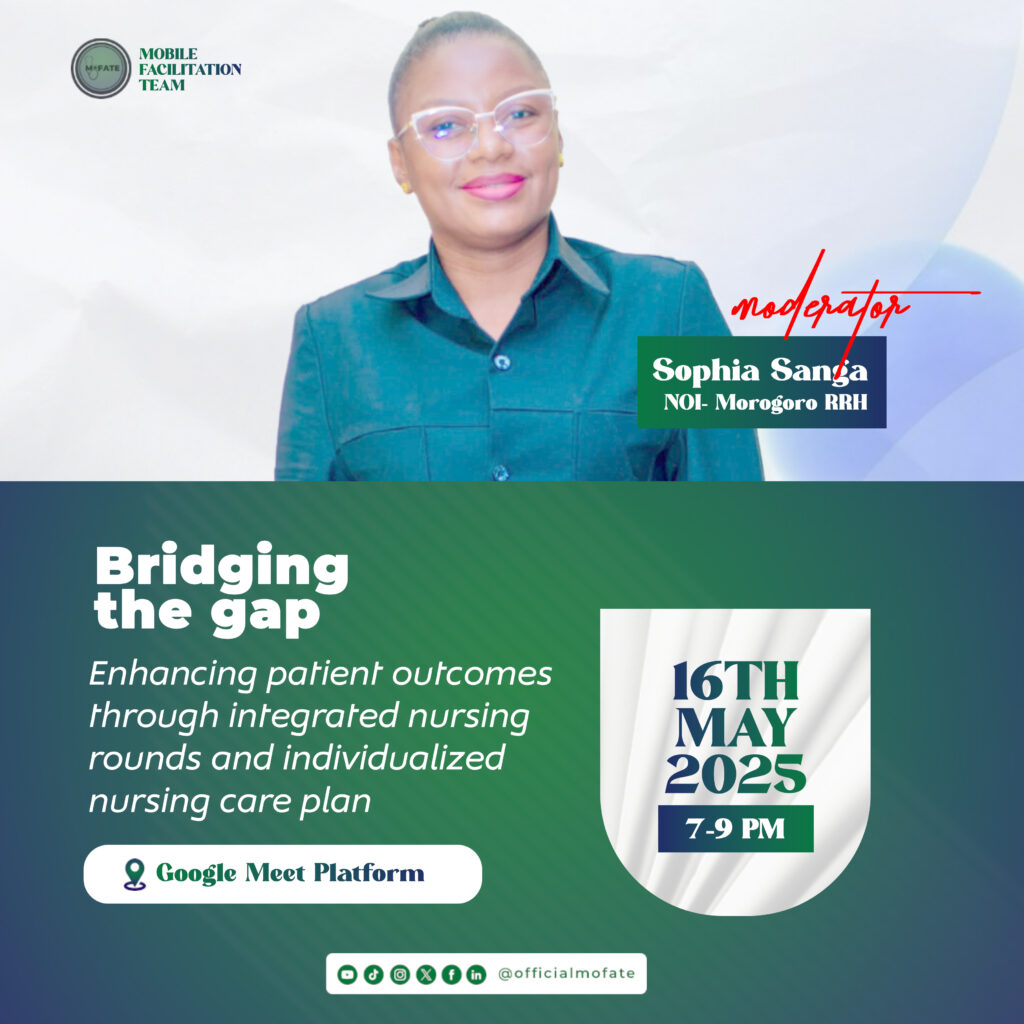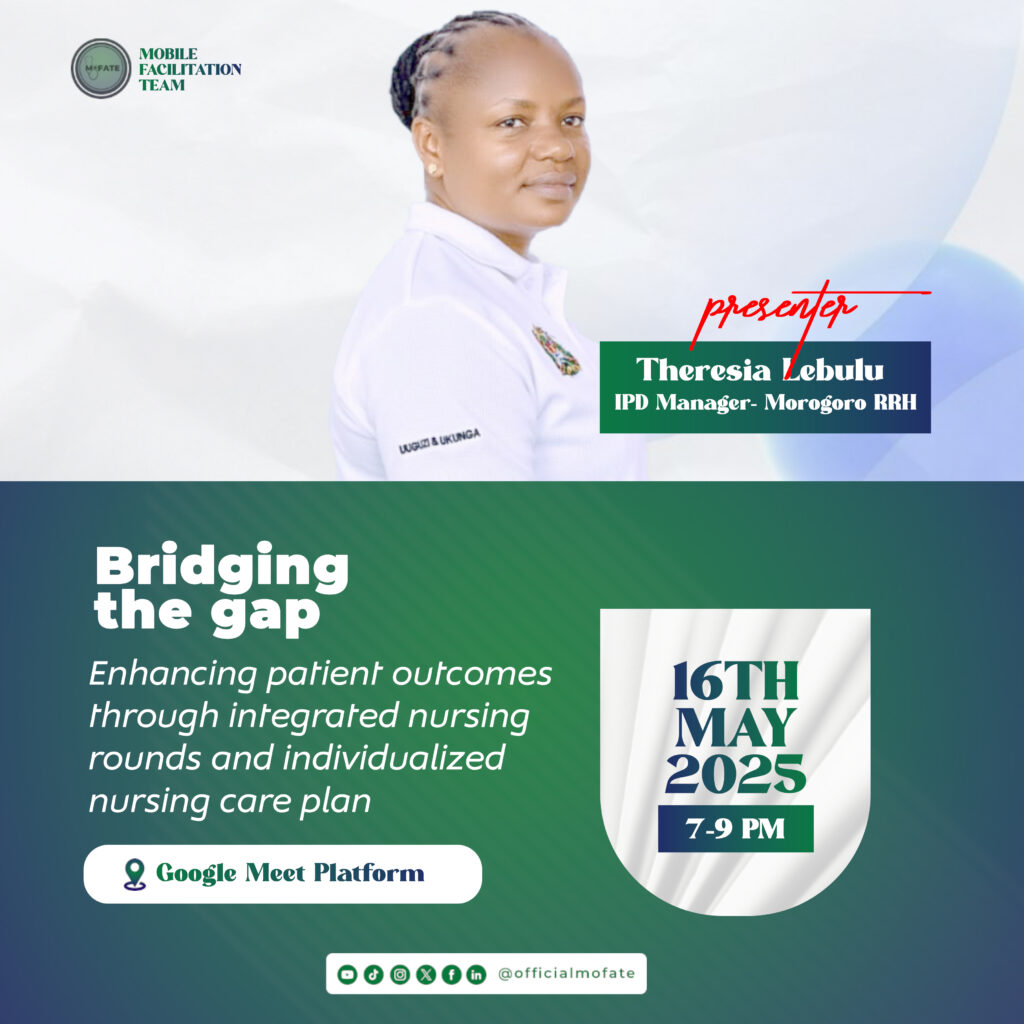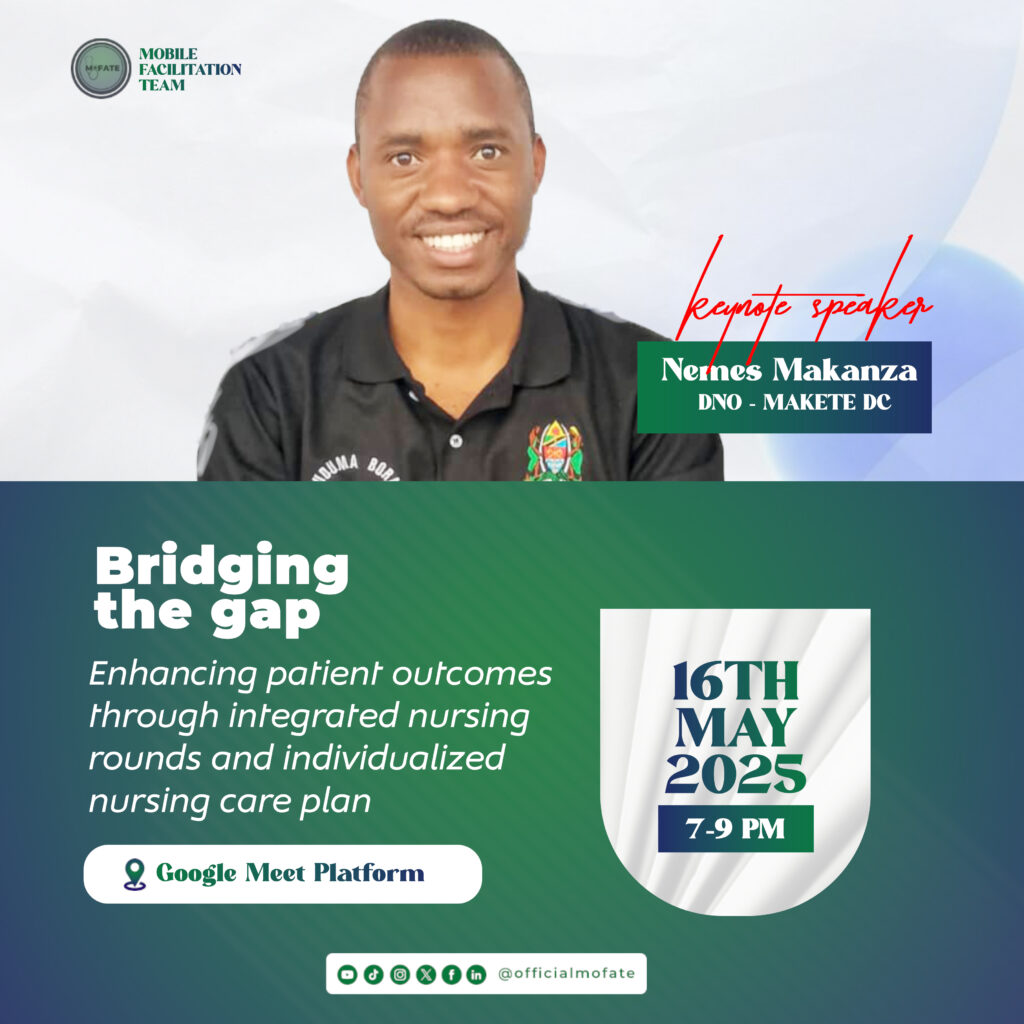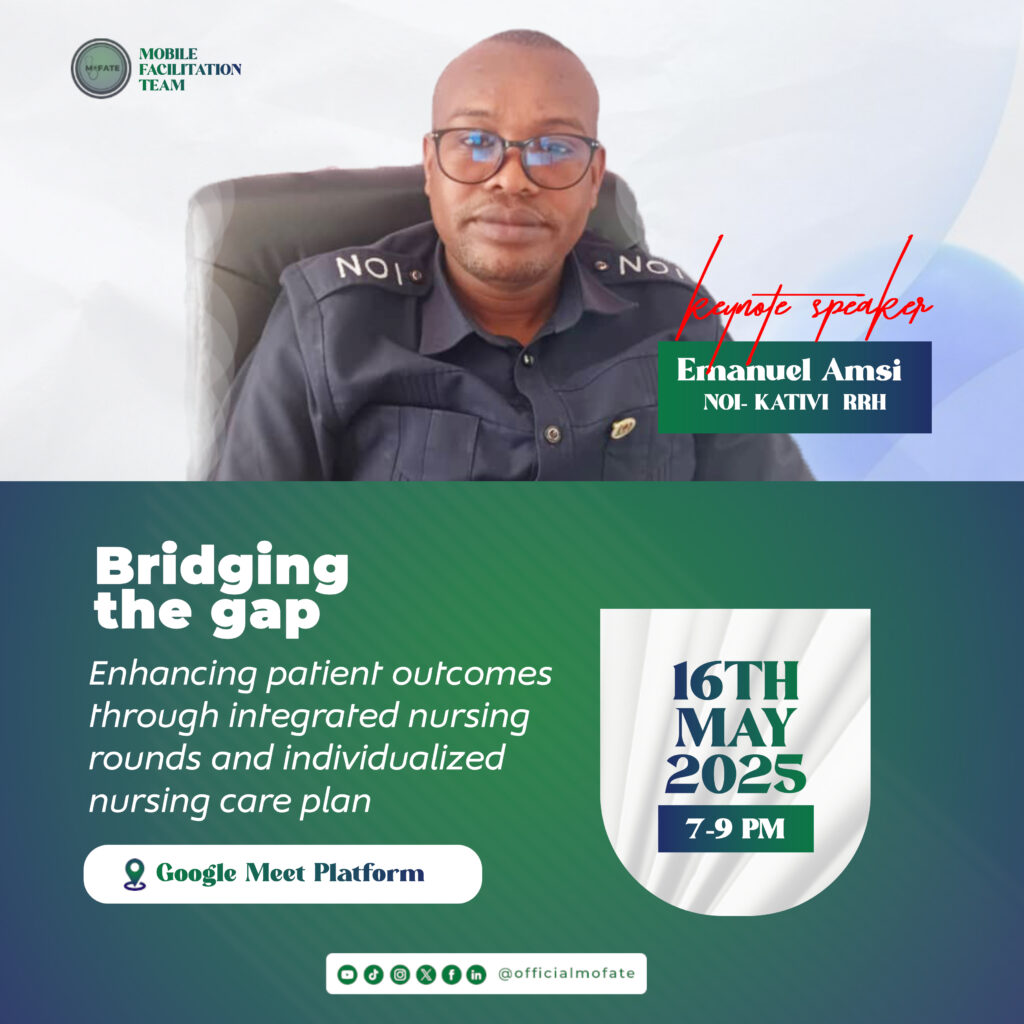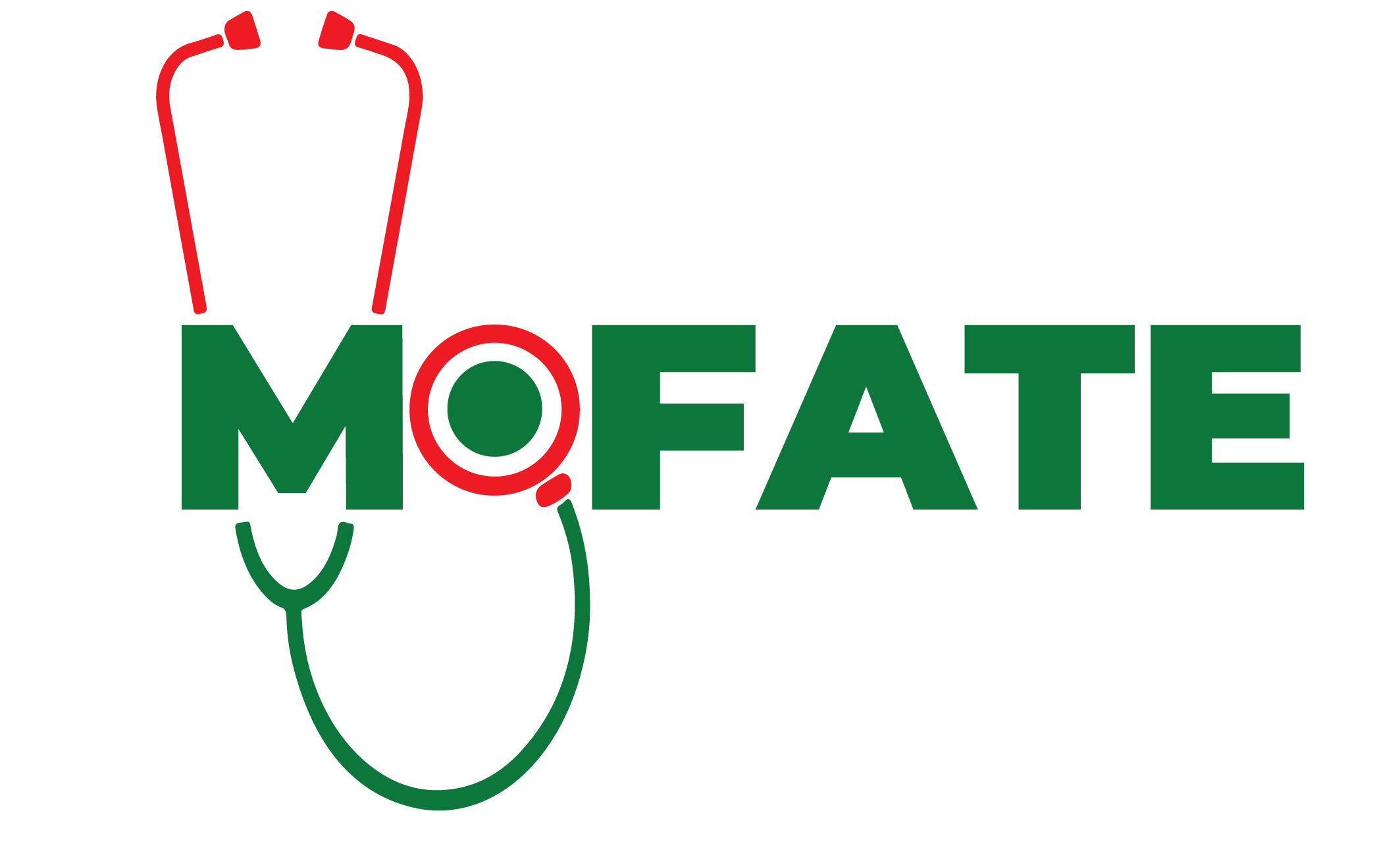In the dynamic landscape of healthcare delivery, the essence of nursing care remains rooted in holistic, patient-centered practices. Among the foundational tools that drive high-quality nursing care are nursing rounds and individualized nursing care plans. These practices serve not only as benchmarks of nursing excellence but also as critical components in promoting patient safety, clinical effectiveness, and professional accountability. However, their effective implementation continues to be a challenge in many healthcare settings due to constraints such as staff shortages, lack of training, poor documentation practices, and organizational inertia.
In response to this persistent issue, the Mobile Facilitation Team (MOFATE) is convening a special online session under the theme: “Bridging the Gap: Enhancing Patient Outcomes through Integrated Nursing Rounds and Individualized Nursing Care Plans.” This session, scheduled for 16th May 2025 from 7:00 PM to 9:00 PM via Google Meet, seeks to unite nursing leaders, educators, and clinical practitioners in a robust scientific discussion aimed at revamping and advancing these core nursing interventions.
Nursing rounds and care plans are not just procedural activities—they are strategic tools that foster multidisciplinary collaboration, continuity of care, and clinical reasoning. Nursing rounds involve scheduled, systematic bedside visits by nurses, often alongside other healthcare professionals, to evaluate the progress of care and address immediate patient needs. Individualized nursing care plans, on the other hand, are tailored documents that outline patient-specific needs, interventions, goals, and expected outcomes, based on comprehensive assessment and evidence-based practices.
Despite their recognized importance, their implementation is often fragmented. A 2023 study by Al Qahtani et al. emphasized that while 86% of nurses acknowledged the value of individualized care plans, only 54% consistently implemented them in practice due to workload and institutional barriers. Similarly, nursing rounds are frequently conducted in an ad hoc manner, lacking standardization and interprofessional coordination.
In contrast to this trend, some institutions, such as Morogoro Regional Referral Hospital, have made notable progress. Through targeted training programs, supportive supervision, and integration of electronic health records (EHRs), the hospital has standardized nursing rounds and linked care plans to the patient’s electronic file, ensuring accessibility and continuity.
Nursing leaders at Morogoro have also embraced mentorship models to support junior staff in care planning and decision-making. As a result, the hospital has reported improved patient satisfaction scores and a reduction in preventable clinical incidents—a testament to the power of integrated nursing interventions.
The MOFATE Approach: Mobilizing Strategic Change
MOFATE, through its scientific and advocacy platform, has identified the need to bridge the policy-practice divide in nursing care. The upcoming online session will focus on:
Theoretical Underpinnings of integrated nursing rounds and care planning.
Practical Experiences from regional hospitals and nursing leaders.
Challenges such as documentation overload, limited supervision, and lack of staff engagement.
Strategic Interventions including training, digital tools, mentorship, and leadership support.
The session will feature speakers with extensive experience in clinical governance, nursing informatics, and patient-centered care. Participants will engage in structured dialogue, breakout discussions, and solution mapping, with the goal of producing actionable recommendations that can be adopted nationally.
Nurses stand at the frontline of care delivery. By strengthening the use of integrated nursing rounds and individualized care plans, they can significantly enhance patient outcomes, reduce medical errors, and reinforce the professional identity of nursing. MOFATE’s initiative is more than a webinar it is a call to action, a step towards transforming theory into practice and ensuring that every patient receives personalized, consistent, and compassionate care.
📅 Day: Friday
🗓️ Date: 16 May 2025
⏰ Time: 7:00 – 9:00 PM
📍 Venue: Google Meet Platform
🔗 Link: https://meet.google.com/ric-nkfo-wio
👥 Invitees: Nurses, Midwives, and Students
References
Al Qahtani, A. M., Alomari, S., Al Zahrani, S. H., & Alotaibi, R. (2023). Barriers to implementation of individualized nursing care plans in clinical settings: A cross-sectional study. International Journal of Nursing Practice, 29(1), e13132. https://doi.org/10.1111/ijn.13132
World Health Organization. (2021). Global strategic directions for nursing and midwifery 2021–2025. Geneva: WHO. https://www.who.int/publications/i/item/9789240033863
Drach-Zahavy, A., Srulovici, E., & Shoham, V. (2022). Nursing rounds and patient outcomes: A systematic review and meta-analysis. Journal of Advanced Nursing, 78(5), 1153–1165. https://doi.org/10.1111/jan.15025
Ministry of Health Tanzania. (2022). National Guidelines for Nursing Documentation and Care Planning. Dodoma: MoH.
Morogoro Regional Referral Hospital (2024). Annual Quality Improvement Report. Morogoro, Tanzania.


